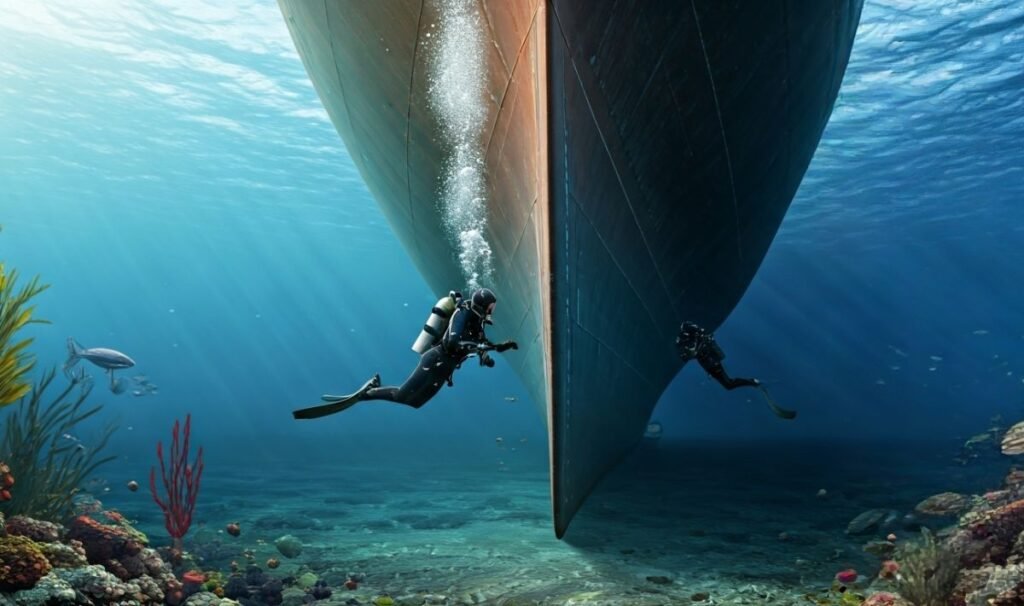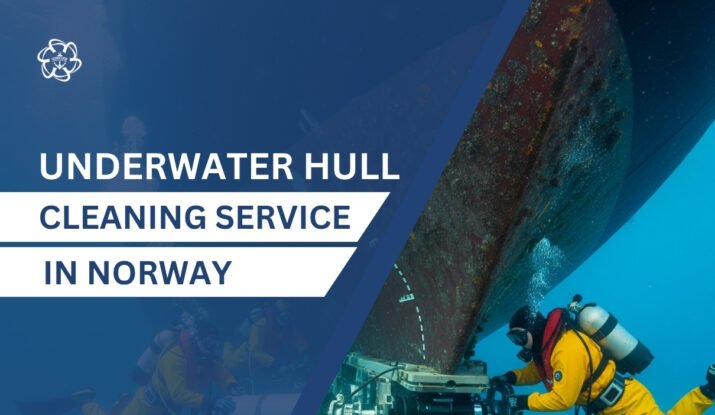Underwater Hull Cleaning in Norway, taking care of a vessel’s underwater hull is key for smooth sailing and good results on the water. In Norway, cleaning the hull under the water is now a top method to fight fouling and help lower both fuel consumption and costs. By making sure polished propellers are restored and hull deterioration is taken care of, these cleaning services can make the vessel work better and also cut down on harmful gases in the air. Top companies, like Kristiansand Dykkeservice, use the latest hull cleaning methods with care for the environment. This is why Norway stands out as a great place for trustworthy and sustainable cleaning and hull maintenance.
Essential Steps in Underwater Hull Cleaning in Norway
Effective underwater hull cleaning in Norway needs good planning and the right steps. The main goal is to make ships work better, but still protect the environment. The process begins with checking the hull condition underwater. This helps to see if the antifouling coating is working. Experts look over every part to find any problems.
Professionals, like Kristiansand Dykkeservice, use high-quality, top technical underwater repair solutions. These tools help fix many things on the hull, such as rudders and bilge keels. They also take care of cleaning and maintaining areas like the vertical sides and the sea chest grids.
These underwater services follow all safety rules and Norwegian standards. Doing regular hull cleaning and repairs stops serious deterioration. It also helps shipowners avoid big and expensive fixes later on. Proper underwater work in Norway gives ships the best chance to last longer and perform well.
Pre-Cleaning Inspection and Safety Measures for Underwater Hull Cleaning in Norway
Before starting any cleaning, it is important to first check the hull condition of the ship. This lets experts see if there is any fouling or damage, look at the condition of the antifouling paint, and give a clear report on the underwater status of the ship. In Norway, safety is very important. These inspections make sure all vessels work within the law and meet environmental rules.
Safety cannot be ignored, especially when diving is needed for cleaning. Norwegian companies like Kristiansand Dykkeservice use trained divers and modern equipment. This helps them make sure that the work is safe and that they do a good job. By knowing the underwater status, people can make better choices about what repairs or cleaning the hull needs.
Doing regular inspections and following safety steps helps prevent damage and deterioration to the hull. It keeps the hull in good shape during cleaning and makes sure nothing gets broken. This way also protects the ship, lowers risks to the environment, and keeps everything working well. Because of this, pre-cleaning inspections are a key part of all underwater services in Norway.
Advanced Cleaning Techniques Used in Norwegian Waters
Norwegian waters need careful cleaning because there are different types of marine fouling in the area. People focus on gentle cleaning techniques to protect the antifouling coating on surfaces while still getting rid of deposits. You must use these cleaning methods on vertical sides, bilge keels, rudders, and dock keel blocks.

Underwater hull cleaning in Norway uses special tools such as strong water jets and chemicals that are friendly to the environment. These cleaning methods hit only the marine growth and do not hurt the underwater surfaces. The team also takes good care of the sea chest grids, which are important for keeping the vessel’s cooling systems running well, so they do not disrupt any work.
Niche areas like bilge keels face a lot of use and damage, so they require custom cleaning solutions too. By joining expert skills with attention to detail, Norway makes sure to do top-notch cleaning work while keeping marine life safe. These methods are why Norway leads the way in protecting the conditions of underwater vessel surfaces.
Underwater Hull Cleaning in Norway and propeller polishing
Underwater hull cleaning in Norway and propeller polishing are essential for reducing vessel fuel consumption and enhancing propeller performance. Proper cleaning not only addresses fuel efficiency loss from fouling, including tubeworms, but also protects the hull surface. Polishing propellers using a specialized polish to remove barnacles improves propulsion while safeguarding structural integrity.
| Service | Benefits |
|---|---|
| Hull Cleaning | Eliminates fouling; enhances fuel efficiency; preserves antifouling coatings. |
| Propeller Polishing | Restores polished propellers, reduces calcium deposits, and boosts propelled speed. |
| Eco-Friendly Methods | Minimises environmental impact using gentle cleaning techniques. |
These services are tailored to the antifouling coating and marine fouling type to ensure the least aggressive cleaning method. Restoring a polished propeller not only increases performance but also curtails greenhouse gas emissions, making it a sustainable practice implemented widely throughout Norwegian waters.
Conclusion
To sum up, taking care of your vessel’s hull with good underwater cleaning is very important in Norway. This cleaning is needed to help your vessel work well and follow the law about the environment. Doing regular cleaning on your hull makes your fuel efficiency better and stops sea life from growing on the hull, which can hurt your vessel. When you do the steps given, like checking before cleaning and using new cleaning methods, you make sure your vessel is in great shape in Norwegian waters. If you need reliable underwater hull cleaning in Norway, you can get in touch for a talk about what you need.
FAQ:
Q1. Why is regular underwater hull cleaning in Norway important for vessels?
Regular hull cleaning prevents underwater deterioration and fouling, improving fuel efficiency and ship performance. It also ensures compliance with Norway’s environmental and operational standards.
Q2. What are the environmental regulations for underwater hull cleaning in Norway?
Norway follows IMO guidelines to protect antifouling paint and prevent fouling waste from entering the water, supporting marine protection and strict environmental standards.
Q3. How often should ship owners schedule hull cleaning in Norwegian waters?
Ship owners in Norwegian waters should plan to clean the hull every three to six months. How often you do this depends on how much the vessel is used and how fast things like algae or barnacles grow. Cleaning the hull more often may be needed during warmer months or in busy areas. This helps stop biofouling and keeps fuel efficiency good for your ship.
Q4. Are there risks of damaging the hull during underwater cleaning?
Using gentle methods for cleaning helps protect the hull and stop damage. In Norway, professionals use safe cleaning techniques like removing barnacles by the dock keel blocks and bilge keels. They take care to prevent the hull and keels from getting worse as they bring things back to good working order. This process is safe, works well, and helps keep everything in top shape.
Q5. How do I choose a reliable underwater hull cleaning in Norway?
Choosing a provider means you need to look at their experience, how good their service is, and if they have people working in Norwegian ports such as Kristiansand. Pick someone who knows a lot about technical underwater repair solutions and can offer the right help for each vessel. Make sure their service team has a lot of experience too.


